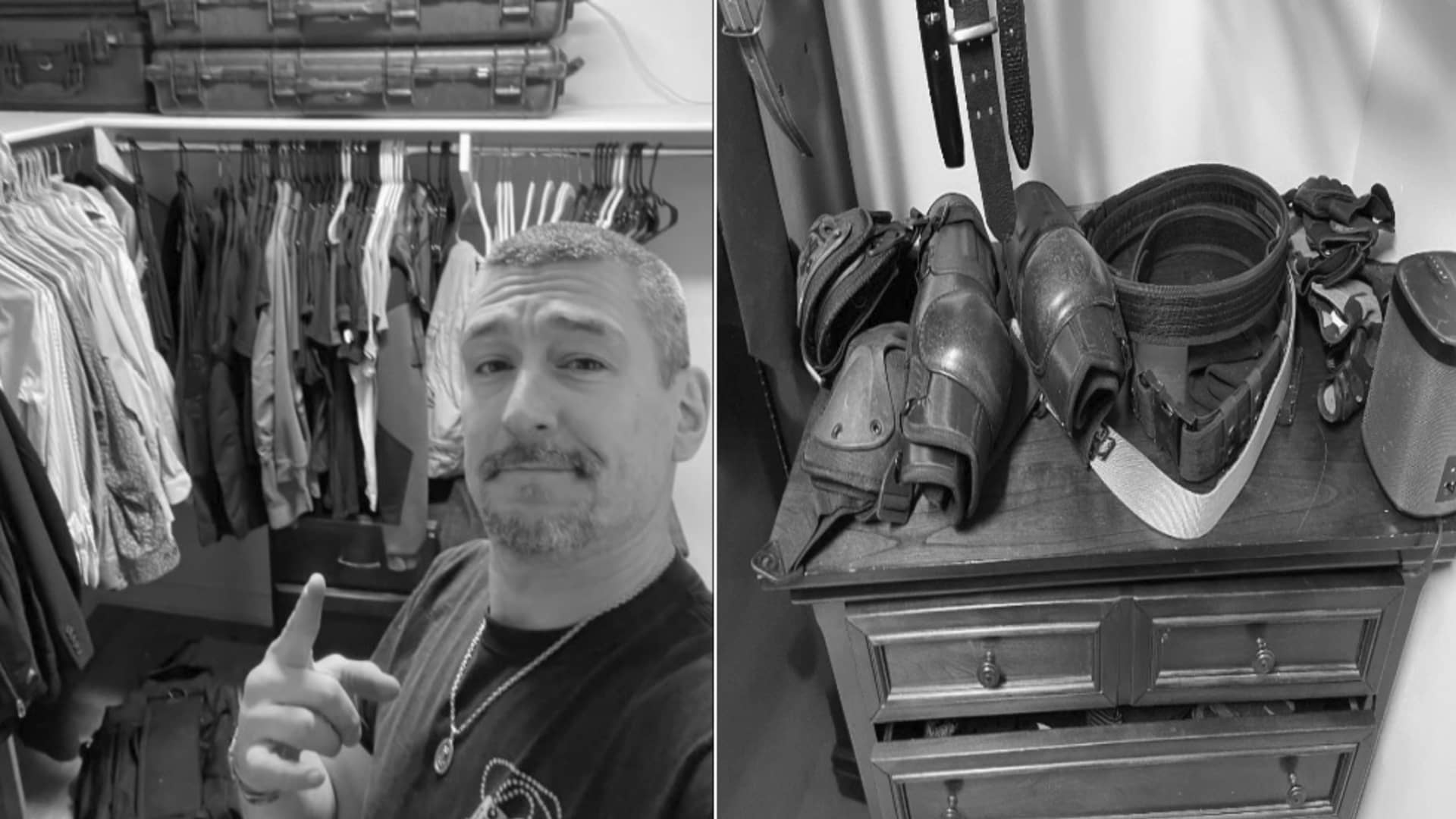
Arian Taherzadeh seen in photos submitted in a D.O.J. affidavit.
Courtesy: D.O.J
One of two men criminally charged with impersonating federal law enforcement agents in Washington, D.C., offered to give an assault rifle worth $2,000 to a U.S. Secret Service agent who was assigned to the protective detail of first lady Jill Biden, a court filing says.
That filing also says that one of the defendants, Arian Taherzadeh, lent what was purported to be a “government vehicle” to the wife of that Secret Service agent, who was not identified by name, and that Taherzadeh “also provided her with a generator.”
The Secret Service agent lived in a Washington apartment building on the floor below Taherzadeh’s apartment, according to the filing, which was written by an FBI agent in support of the criminal complaint against Taherzadeh, 40, and his 35-year-old co-defendant, Haider Ali.
Taherzadeh also allegedly gave members of the Secret Service and an employee of the Department of Homeland Security “rent-free apartments (with a total yearly rent of over $40,000 per apartment), iPhones, surveillance systems, a drone, a flat screen television, a case for storing an assault rifle, a generator and law enforcement paraphernalia,” the filing says.
One of those agents was assigned to protect the White House as part of the Secret Service’s uniformed division, the filing said.
That agent lived rent-free in a three-bedroom apartment provided by Taherzadeh at the same complex, according to the filing, which said the residence normally would rent for more than $48,000 annually.
Taherzadeh told the agent that a division of DHS “had approved extra rooms as part of his operations, and that [agent] could live in one of them for free,” the filing said. “The investigation confirmed that there are no such [DHS] operations and that it authorized no such expense.”
Taherzadeh and Ali were arrested Wednesday during a raid on that building in the Southeast section of D.C. on a charge of “false impersonation of a federal officer.” Both men are due to appear in federal court in Washington later Thursday.
Four members of the Secret Service have been placed on administrative leave pending further investigation in the case.
In a statement Thursday, the Secret Service said it “has worked, and continues to work, with its law enforcement partners on this ongoing investigation.”
“All personnel involved in this matter are on administrative leave and are restricted from accessing Secret Service facilities, equipment, and systems,” the agency said. “The Secret Service adheres to the highest levels of professional standards and conduct and will remain in active coordination with the Departments of Justice and Homeland Security.”
Photos of Arian Taherzadeh submitted in a DOJ affidavit.
Courtesy: DOJ
The FBI said in an affidavit that both men, from as early as February 2020 until their arrest, pretended to be agents working for the Department of Homeland Security, with the use of insignias and firearms used by federal agents.
The affidavit says the men did this “to ingratiate themselves with members of federal law enforcement and the defense community.”
The affidavit written by an FBI agent says the men’s imposter act began to be exposed on March 14, when a U.S. Postal inspector responded to the apartment complex to investigate an alleged assault on a letter carrier.
During the investigation of that incident, the inspector learned from people at the complex that Taherzadeh and Ali, “who represent themselves as Department of Homeland Security Investigations (HSI) Special Agents, may have witnessed the assault.”
When the inspector interviewed both men, they identified themselves as investigators with the U.S. Special Police Investigation Unit, and “deputized ‘special police’ with the city of Washington.”
The men also “claimed to be involved in undercover gang-related investigations as well as conducting investigations related to the violence at the United States Capitol on January 6, 2021,” the affidavit said.
Residents at the apartment complex told the postal inspector that the men “have video surveillance set up in various parts” of the complex, and that they had told residents they “can access, at any time, the cellular telephones” of residents, according to the affidavit.
The inspector determined that the men “were in regular contact with several members” of the Secret Service who live in the complex, who had received gifts from the men.
That filing also says that a witness, who did not work in law enforcement, told the FBI that Taherzadeh “recruited” that person for possible employment at DHS and to conduct research into a government contractor who provided support to the Defense Department and the U.S. intelligence community.
As part of that bogus recruitment process, Taherzadeh told the witness he would need to shoot the witness with an air rifle “in order to evaluate [their] reaction and pain tolerance,” the filing said. The witness agreed, and was shot by Taherzadeh, the filing says.






